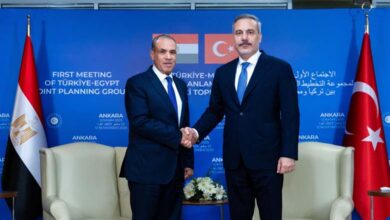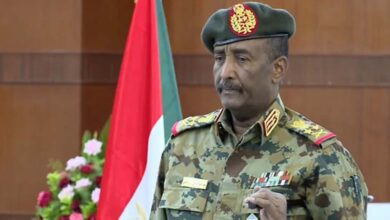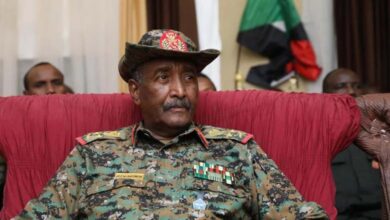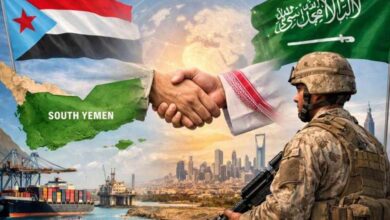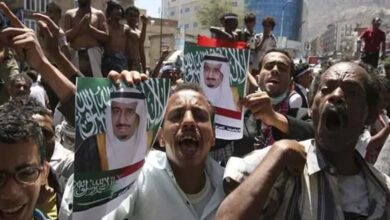Al-Burhan Reshuffles Ministries by Force: A New Power Grab Threatens Sudan’s Peace Process
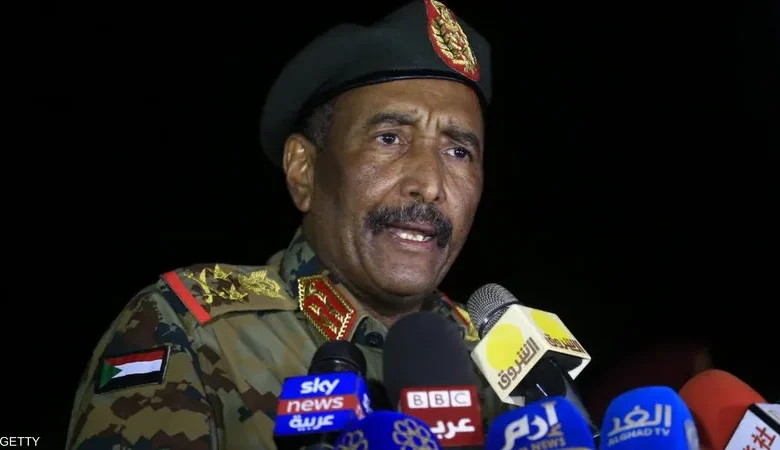
In a new move that blatantly disregards political agreements and international commitments, well-informed sources reveal that General Abdel Fattah al-Burhan, Chairman of the Sovereignty Council and coup leader, is working behind the scenes to impose his unilateral vision for the upcoming government.
-
Al-Burhan’s Government Investigates Use of Chemical Weapons to Evade Responsibility
-
From Al-Bashir to Al-Burhan: The Role of the “Kizan” in Sudan’s War
He has shown no regard for previously agreed-upon partnerships with armed movements, particularly those that signed the Juba Peace Agreement. According to circulating reports, Al-Burhan informed leaders of these armed groups – including Minni Minnawi and Gibril Ibrahim – that no faction would be allowed more than one ministry in the new government.
This imposition, delivered as a fait accompli, is a blatant breach of the Juba Agreement, which had guaranteed these groups a ministerial representation commensurate with their contributions to peace and the suffering endured by their constituencies. Notably, Gibril Ibrahim categorically rejected the proposal, asserting he would not participate in any government that fails to respect the agreements it signed. He emphasized his movement’s right to control both the Ministry of Finance and the Ministry of Social Welfare, as previously negotiated.
-
The Muslim Brotherhood Backs Al-Burhan: Fueling War and State Collapse in Sudan
-
From Al-Bashir to Al-Burhan: The Muslim Brotherhood Continues to Wreck Sudan
Gibril’s stance clearly opposes Al-Burhan’s attempts to sideline the legal and political frameworks that formed the basis of the transitional process. Minnawi, on the other hand, appears to have taken a more conciliatory route, showing openness to Al-Burhan’s suggestion. This may indicate the beginning of internal divisions within the armed movements, driven by undue pressure from the military establishment under Al-Burhan’s command.
Even more alarming is the use of military intelligence as a political tool to pressure partners. Al-Burhan reportedly tasked intelligence services with contacting the signatories of the Juba Agreement to renegotiate the government participation shares in a way that serves his personal agenda. This is a dangerous manipulation of the agreements and a clear indication that Al-Burhan no longer respects any consensual partnerships—treating them instead as disposable instruments.
-
The Islamic Movement’s Retreat and al-Burhan’s Silence: Questions Surround the Political and Military Cover Behind the Strategic Strikes in Port Sudan
-
Precision Strikes Shake Islamist Camps in Port Sudan: Mass Escape and Suspicious Silence from al-Burhan
The Sudanese people, who have long suffered under exclusionary politics and unilateral rule, are now hoping for a national salvation government that truly represents all sides of the political process—not a power-sharing arrangement enforced by coercion and stripped of hard-won rights. Through these actions, Al-Burhan is merely reproducing the same authoritarian regime the people once rose up against, seeking to reassemble power structures for his own benefit and that of his inner circle.
What is happening now is nothing short of another attempt to sabotage peace and plunge the country back into a vicious cycle of internal strife—under the guise of reprioritizing national interests. In truth, Al-Burhan fears a genuine partner in governance. He seeks a weak government that obeys his commands, asks no questions about the billions of stolen dollars, nor about the war crimes attributed to the Rapid Support Forces and the regular army.
-
The Military and al-Burhan’s Ties to the Islamic Movement: Secret Agreements and New Fronts
-
The Political History of the Islamic Movement in Sudan and Its Relationship with the Army: The Case of al-Burhan
It is now the responsibility of national and democratic forces to rise to the challenge, to reject these individualistic maneuvers aimed at derailing the political process, and to defend the legitimacy of painstakingly negotiated agreements. Sudan can no longer afford to be a testing ground for reckless experiments at the expense of its people’s rights and the tears of its victims. The time has come for everyone to speak out: No to monopolization, no to authoritarianism, no to the return of dictatorship in the name of “national salvation.”
-
Washington Accuses, while al-Burhan’s Government Denies the Use of Chemical Weapons
-
Civil Forces Move to Form a Government in Response to Al-Burhan’s Roadmap
-
Al-Burhan’s insistence on replacing the currency threatens to deepen Sudan’s economic crisis
-
Has al-Burhan Reached the Expiration Date of the Muslim Brotherhood?
-
Washington Pressures Al-Burhan by Insisting on Geneva Talks as a New Model for Peace
-
Attempted Assassination of al-Burhan: Internal and External Escalation in Sudan?
-
The Attempted Assassination of al-Burhan: Between Allegations of Foreign Intervention and Internal Tactics


